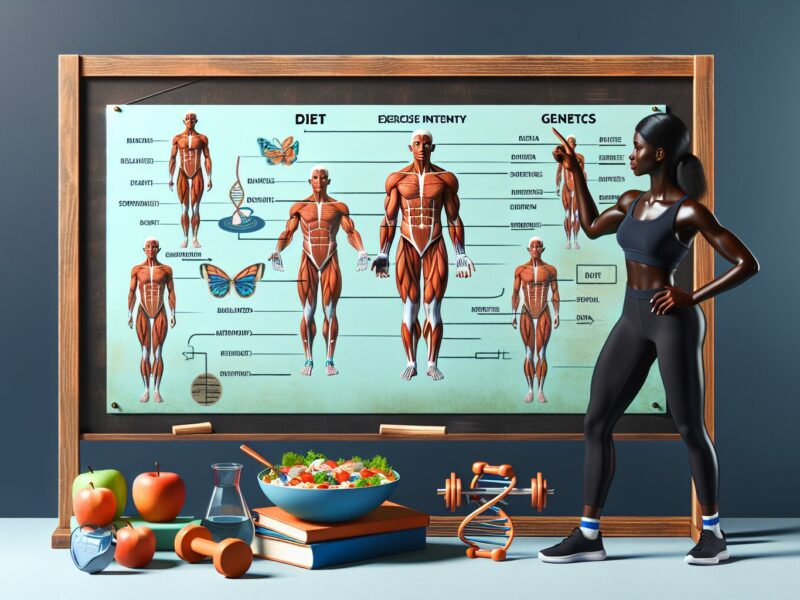Have you ever wondered how long it takes for your hard work at the gym to actually show results? We all want to see those muscle gains, but the question remains: how long does it truly take to notice a difference? Whether you’re lifting weights or doing bodyweight exercises, this article will delve into the factors that determine how quickly you can see visible changes in your muscles. So, strap on your workout shoes and get ready to find out when those gains might start becoming visible!

Factors Affecting Muscle Gain
Muscle gain is a complex process influenced by various factors. Understanding these factors can help you optimize your muscle-building journey and achieve better results. Here are some key factors that affect muscle gain:
Genetics
Genetics plays a significant role in determining your muscle-building potential. Some individuals naturally have a higher propensity for muscle growth due to their genetic makeup. Factors such as muscle fiber composition, hormone levels, and metabolism are influenced by genetics and can impact the rate at which you build muscle.
While genetics may set the baseline for your muscle-building potential, it’s important to remember that everyone can make progress regardless of their genetic predispositions. With the right training, nutrition, and consistency, you can maximize your genetic potential and achieve your fitness goals.
Age
Age is another factor that affects muscle gain. As we age, our muscle mass naturally declines, and our bodies become less efficient at building muscle. This means that younger individuals might notice muscle gain more quickly than older individuals.
However, regardless of your age, regular resistance training and proper nutrition can help mitigate the effects of muscle loss and promote muscle growth. So, don’t let your age discourage you; it’s never too late to start building muscle and improving your physique.
Gender
Gender can also influence muscle gain. Generally, males tend to have a higher muscle-building potential compared to females due to higher testosterone levels. Testosterone is a hormone that plays a crucial role in muscle protein synthesis and muscle growth.
However, this doesn’t mean that women can’t build muscle. With the right training and nutrition strategies, women can achieve significant muscle gains and improve their overall strength and physique. So, regardless of your gender, focus on training smart and fueling your body properly to optimize muscle growth.
Training Experience
Training experience is a crucial factor when it comes to muscle gain. Beginners who are new to resistance training typically experience rapid progress in the early stages of their muscle-building journey. This is known as neural adaptation, which refers to the enhanced coordination between your muscles and nervous system.
As you gain experience and become more advanced, your rate of muscle gain may slow down. This is because your body becomes more adapted to the stress of resistance training, requiring more progressive overload and strategic programming to continue making gains. Nevertheless, with consistent training and proper programming, even experienced lifters can continue to build muscle.
Nutrition
Proper nutrition is a fundamental aspect of muscle gain. To build muscle, you need to consume a balanced diet that provides an adequate amount of macronutrients (protein, carbohydrates, and fat) and micronutrients (vitamins and minerals).
Protein is especially important for muscle growth as it provides the building blocks (amino acids) necessary for muscle repair and growth. Aim to consume around 0.7-1 gram of protein per pound of body weight per day. Additionally, carbohydrates and fats are essential for providing energy during workouts and supporting overall recovery.
It’s also crucial to prioritize nutrient timing, particularly around your workouts. Consuming protein and carbohydrates before and after your training sessions can help optimize muscle protein synthesis and replenish glycogen stores.
Rest and Recovery
Rest and recovery are often overlooked but are vital for muscle gain. While it may seem counterintuitive, muscles actually grow during periods of rest, not during training sessions. Adequate rest allows your body to repair and rebuild the muscle tissues that were broken down during intense workouts.
Make sure to prioritize both sleep and active recovery. Aim for 7-9 hours of quality sleep per night to promote optimal muscle growth and recovery. Additionally, incorporating rest days into your training routine can prevent overtraining and reduce the risk of injury.
Intensity of Workouts
The intensity of your workouts is a key factor in muscle gain. To stimulate muscle growth, it’s important to challenge your muscles with progressively heavier weights or increased resistance over time. This is known as progressive overload.
By consistently increasing the demands placed on your muscles, you provide a stimulus for growth and adaptation. Gradually increasing the intensity of your workouts ensures that your muscles are continuously challenged, promoting muscle hypertrophy.
Consistency
Consistency is crucial when it comes to muscle gain. Building muscle takes time and dedication, and it’s essential to stick to a regular training regimen. Aim for a minimum of three resistance training sessions per week to optimize muscle growth.
Consistency also applies to nutrition and recovery. Make sure to fuel your body with the proper nutrients consistently and prioritize sufficient rest and recovery. Remember, muscle gain is a long-term process, and staying consistent is key to achieving your goals.
Individual Differences
It’s important to recognize that individual differences play a role in muscle gain. Each person’s body is unique, and factors such as metabolism, hormone levels, and lifestyle can impact the rate at which muscle is gained.
Comparing your progress to others may become demotivating, as everyone’s journey is different. Focus on your own progress, celebrate small victories, and stay committed to your training and nutrition plan. Embrace your individuality and trust that your efforts will yield results.
Supplements
Supplements can play a supportive role in muscle gain, but they should never replace a balanced diet and proper training. Whey protein, creatine, and branched-chain amino acids (BCAAs) are commonly used supplements that can aid in muscle recovery and growth.
Before incorporating any supplements into your routine, it’s best to consult with a healthcare professional or a registered dietitian to ensure they align with your specific goals and needs.
Short-Term Indicators of Muscle Gain
While building significant muscle takes time, there are various short-term indicators that suggest you’re on the right track. These indicators include:
Increased Strength
One of the first signs of muscle gain is an increase in strength. As you progressively overload your muscles through resistance training, you’ll notice improvements in your ability to lift heavier weights or perform more repetitions. This increase in strength is a positive indication that your muscles are adapting and growing.
Pump and Vascularity
During and immediately after a workout, you may experience what is commonly referred to as the “pump.” This occurs when blood rushes into the muscles, giving them a fuller and more vascular appearance. While the pump is temporary and subsides after your workout, it can be an exciting visual indicator of muscle engagement and growth.
Muscle Soreness
Another short-term indicator of muscle gain is muscle soreness, also known as delayed-onset muscle soreness (DOMS). DOMS typically occurs within 24-48 hours after a workout and is a result of the micro-tears that happen in the muscle fibers during intense training.
While muscle soreness can be uncomfortable, it’s a sign that your muscles are being challenged and will repair themselves to become stronger and larger. As you continue to train, you may notice that the intensity and duration of muscle soreness decrease, indicating improved muscular endurance and adaptation.
Improved Mood and Mental Clarity
Engaging in regular exercise, including resistance training, has numerous mental health benefits. When it comes to muscle gain, you may notice improvements in your mood and mental clarity. Exercise triggers the release of endorphins, which are often referred to as “feel-good” hormones.
Additionally, the sense of accomplishment and progress you experience from building muscle can boost your self-confidence and overall mental well-being. Taking care of your physical health through exercise can positively impact your mental and emotional health.
Physical Changes in Appearance
Although significant physical changes may take longer to notice, short-term improvements in your physical appearance can be indicators of muscle gain. As you build muscle, your body composition may change, resulting in a leaner and more defined physique.
While changes may be subtle initially, paying attention to small differences in muscle definition and overall body shape can help you stay motivated and recognize progress.
Medium-Term Indicators of Muscle Gain
As you continue your muscle-building journey, you’ll start to notice more substantial changes in your physique. Some medium-term indicators of muscle gain include:
Improved Muscle Definition
With consistent resistance training, you’ll begin to see improved muscle definition. Muscles will appear more toned and have better separation between individual muscle groups. This enhanced muscle definition is a result of increased muscle mass and reduced body fat due to the combination of proper nutrition and effective training.
Increased Muscle Size
Medium-term muscle gain often involves increased muscle size, also known as muscle hypertrophy. You’ll notice that your muscles look fuller and more developed. This increase in muscle size is a result of hypertrophy, which occurs when muscle fibers adapt to resistance training by increasing in size.
Weight Gain
One of the indicators of muscle gain is an increase in overall body weight. However, it’s important to note that weight gain doesn’t solely equate to muscle gain. When you build muscle, your weight may increase due to the added lean muscle mass. It’s essential to focus on body composition changes rather than solely relying on the scale.
Changes in Body Composition
Medium-term muscle gain often results in improved body composition. While weight might slightly increase due to muscle gain, body fat percentage should decrease. Reduced body fat and increased muscle mass contribute to a leaner and more athletic physique.
Measuring body fat percentage with tools like calipers or undergoing a body composition analysis can help track changes and provide a more accurate reflection of your progress.
Improved Endurance and Performance
With increased muscle mass and strength, you’ll likely experience improved endurance and athletic performance. You may notice that you can maintain higher intensity levels during workouts, perform more repetitions, or sustain longer cardio sessions. These improvements in endurance and performance are indications of increased muscle capacity and efficiency.
Long-Term Indicators of Muscle Gain
Building significant muscle mass and strength takes time and consistent effort. Long-term indicators of muscle gain include:
Significant Muscle Hypertrophy
Long-term muscle gain is characterized by significant muscle hypertrophy. Your muscles will continue to grow and increase in size as you consistently challenge them through resistance training. Over time, you’ll notice a visible transformation in the size and definition of your muscles.
Noticeable Muscle Mass
As muscle hypertrophy continues, the overall increase in muscle mass becomes noticeable. Your clothes may fit differently, and others may notice the changes in your physique. Achieving noticeable muscle mass is a testament to your dedication, consistency, and hard work in the gym and the kitchen.
Enhanced Athletic Performance
With consistent and progressive resistance training, you’re likely to experience enhanced athletic performance. Your increased muscle mass and strength will provide you with the ability to perform at higher levels in various sports and physical activities.
Improved athletic performance may include increased speed, power, agility, and overall coordination. These enhancements are a direct result of the muscle gain and increased neuromuscular efficiency developed through dedicated training.
Permanent Changes in Body Composition
Long-term muscle gain often leads to permanent changes in body composition. The combination of increased muscle mass and a reduced body fat percentage will likely become a permanent part of your physique.
Even if you decide to decrease your muscle-building efforts in the future, the changes in body composition you’ve achieved will have a lasting impact. Building muscle sets a foundation for a healthier and more vibrant body long-term.

Timeline for Muscle Gain
It’s important to manage your expectations when it comes to muscle gain. Results will vary depending on factors such as genetics, training intensity, nutrition, and overall consistency. While the timeline for muscle gain differs for each individual, here’s a general breakdown of what you can expect:
Weeks 1-4: Neural Adaptation
In the first few weeks of resistance training, your body goes through a process called neural adaptation. During this phase, you may experience strength gains due to improved coordination between your muscles and central nervous system. Neural adaptation sets the foundation for future muscle growth.
Weeks 4-8: Initial Strength Gains
Around the four to eight-week mark, you’ll begin to notice more significant improvements in strength. This is because your muscles are becoming more efficient at generating force and adapting to the demands of your training. Strength gains during this phase are primarily due to neurological adaptations.
Weeks 8-12: Visible Changes
Between weeks eight and twelve, you may start to see visible changes in your physique. Your muscles may appear more defined, and you may notice slight increases in muscle size. While the changes may not be drastic, the progress will serve as motivation to continue your muscle-building journey.
Months 3-6: Steady Progress
Between three to six months, muscle gain becomes more evident. You’ll likely experience noticeable improvements in muscle definition, size, and overall strength. During this phase, it’s important to stay consistent with your training program and nutrition to continue making steady progress.
Months 6-12: Continued Development
From six months to a year, you can expect continued development in muscle size, strength, and overall physique. Consistency remains key during this phase to maintain and build upon your progress. It’s important to approach this stage with patience and a long-term mindset.
Long-Term Commitment
To achieve your muscle gain goals and maintain your progress, it’s essential to view muscle-building as a long-term commitment. Building significant muscle mass takes time and persistence. Stay focused, embrace the process, and remain committed to proper training, nutrition, and recovery strategies.
Tips to Maximize Muscle Gain
To maximize your muscle gain potential, consider implementing the following tips:
Follow a Proper Training Program
Following a structured and progressive training program designed for muscle gain is crucial. Seek guidance from a qualified fitness professional or strength coach who can customize a program based on your goals, experience level, and individual needs. A well-designed program will include a variety of compound exercises, progressive overload, and balanced training splits.
Eat a Balanced Diet
Dialing in your nutrition is paramount for optimal muscle gain. Consuming a well-balanced diet that provides sufficient calories, macronutrients, and micronutrients is essential. Focus on consuming an adequate amount of protein to support muscle repair and growth. Incorporate whole foods, such as lean meats, fish, eggs, legumes, fruits, vegetables, and whole grains, to ensure you’re meeting your nutritional needs.
Get Sufficient Rest and Recovery
Don’t underestimate the importance of rest and recovery in your muscle-building journey. Aim for 7-9 hours of quality sleep each night to support muscle repair and growth. Incorporate rest days into your training program to allow your muscles to recover and prevent overtraining. Additionally, consider incorporating techniques such as foam rolling, stretching, and massage to aid in muscle recovery.
Ensure Progressive Overload
Progressive overload is essential for muscle gain. Continuously challenge your muscles by gradually increasing the intensity, volume, or resistance of your workouts over time. This can be achieved through adding more weight, performing additional repetitions, or reducing rest times. Keep a training journal or utilize tracking apps to monitor your progress and ensure consistent progression.
Monitor and Adjust Your Training
Regularly assess your training program and make necessary adjustments based on your progress and goals. Consider incorporating different training techniques such as supersets, drop sets, or tempo variations to keep your workouts challenging and prevent plateaus. It’s also important to listen to your body and modify your training if you experience pain or discomfort.
Stay Consistent
Consistency is the key to long-term muscle gain. Stick to your training program, adhere to your nutrition plan, and prioritize rest and recovery consistently. Building muscle takes time and dedication, so trust the process and remain committed.
Consider Professional Guidance
If you feel overwhelmed or unsure about your muscle-building journey, consider seeking professional guidance. A qualified personal trainer, strength coach, or registered dietitian can provide personalized advice, support, and accountability to help you reach your goals more effectively.
Avoid Overtraining or Undertraining
Finding the balance between training enough and overdoing it is important for optimal muscle gain. Avoid overtraining by allowing sufficient rest and recovery between workouts. On the other hand, undertraining can also limit your progress. Strive for the right balance by following a well-structured training program and paying attention to your body’s recovery needs.
Stay Hydrated
Proper hydration is often overlooked but is crucial for overall health and optimal muscle gain. Make sure to drink enough water throughout the day, especially during and after workouts. Staying hydrated helps maintain muscle function, joint lubrication, and nutrient uptake, enhancing your overall training performance.
Manage Stress Levels
High levels of stress can negatively impact your muscle gain progress. Chronic stress can elevate cortisol levels, which can hinder muscle growth and recovery. Incorporate stress-management techniques into your routine, such as meditation, yoga, or journaling. Prioritizing self-care and finding healthy outlets to manage stress can enhance your muscle-building journey.

Common Mistakes and Misconceptions
Avoiding these common mistakes and misconceptions can help you stay on track and optimize your muscle gain progress:
Expecting Overnight Results
Building muscle takes time, and it’s important to have realistic expectations. Avoid expecting overnight results or comparing yourself to others. Focus on consistent progress and celebrate the small victories along the way.
Neglecting Proper Nutrition
Proper nutrition is crucial for muscle gain. Neglecting your diet can hinder progress significantly. Make sure to fuel your body adequately with a balanced diet that provides sufficient calories and nutrients to support muscle growth.
Ignoring Rest and Recovery
Rest and recovery are essential for muscle growth and overall health. Ignoring the importance of rest can lead to overtraining, increased risk of injury, and hindered progress. Make sure to prioritize sleep, rest days, and active recovery techniques to optimize your muscle gain journey.
Relying Too Much on Supplements
While supplements can be beneficial, they should not replace a balanced diet and proper training. Many supplements marketed for muscle gain have limited scientific evidence to support their effectiveness. Focus on a nutrient-dense diet and proper training, utilizing supplements as supplementary support rather than relying solely on them.
Lack of Consistency
Consistency is key when it comes to muscle gain. Skipping workouts or sporadically following a training plan can hinder progress. Stay consistent with your training, nutrition, and recovery strategies to optimize muscle growth.
Comparing Progress to Others
Everyone’s muscle-building journey is unique. Avoid comparing your progress to others, as this can be demotivating and counterproductive. Focus on your own goals, progress, and personal achievements.
Overtraining Without Adequate Rest
Excessive training without sufficient rest and recovery can impede muscle growth and lead to burnout. Listen to your body and allow for rest days and proper recovery to avoid overtraining. Give your muscles the time they need to repair and grow.
Underestimating the Importance of Sleep
Adequate sleep is essential for muscle recovery, growth, and overall health. Poor sleep can negatively impact hormone production, recovery processes, and energy levels, hindering muscle gain progress. Prioritize quality sleep to support your journey.
Neglecting Proper Form and Technique
Using improper form and technique during exercises can lead to injuries and inhibit progress. As you increase the weight or intensity, focus on maintaining proper form to ensure you’re effectively targeting the intended muscles and minimizing the risk of injury.
Using Unrealistic Goals as a Measure of Progress
Setting unrealistic goals can be demotivating and cause unnecessary stress. Instead, set achievable, measurable, and time-bound goals to track your progress effectively. Celebrate each milestone reached and maintain a positive mindset throughout your muscular development journey.
By understanding the factors influencing muscle gain, recognizing the indicators of progress, and implementing smart strategies, you can maximize your muscle-building potential and achieve the results you desire. Remember, building muscle is a journey that requires patience, consistency, and dedication. Enjoy the process and embrace the positive changes happening within your body as you work towards your goals.


